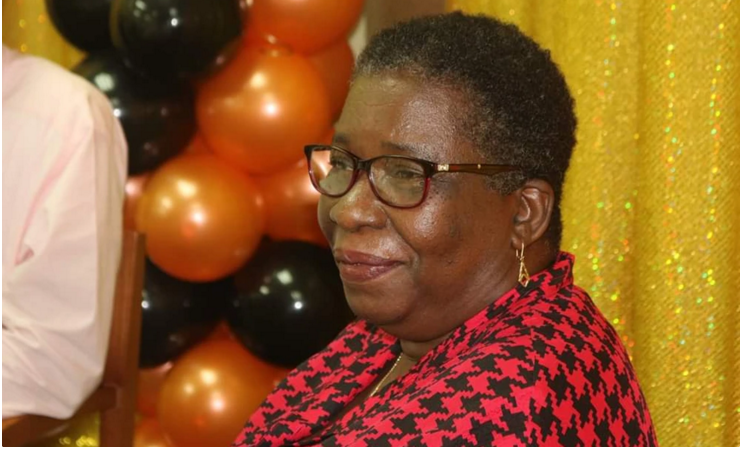Caribbean Statistics Day: OECS Commission features Gatlin Roberts
By Loverly Anthony
Outgoing Chief Statistician for St. Vincent and the Grenadines reflects on almost four-decade tenure

Wednesday, October 16, 2019 — In observance of Caribbean Statistics Day 2019, the OECS Statistics in Focus sat down with outgoing Chief Statistician in St. Vincent and the Grenadines, Gatlin Roberts.
A native of St. Vincent and the Grenadines, Gatlin Roberts began her career in the public service in February, 1982 as a primary school teacher. Only three weeks later, however, she would be called in for an interview with the Services Commissions Department that would change the trajectory of her professional life.
On International Women’s Day (March 8) 1982, Roberts began her sojourn in the field of statistics, serving in several capacities within the National Statistical Office (NSO) in St. Vincent and the Grenadines before her elevation to the post of Chief Statistician in 2006.
“Before being assigned to the Statistical Office, I had never heard of that office,” Roberts fondly reflects on her start in the field. “I didn’t choose [statistics], it chose me.”
It was not long before she found herself enveloped in the work of the office, its importance and the passion that radiated from her fellow coworkers.
“When I started, it was a small office with about eight persons and everyone was quite willing to share knowledge and information with me. We formed a special bond within the office very quickly, it felt like a family. We had a wonderful relationship both inside and outside the office.”
Roberts also welcomed the opportunity to develop her knowledge and skills, engaging in several workshops, seminars and trainings over the years.
Reflecting on her tenure, Roberts highlighted the successful incorporation of information technology (IT) and geospatial information systems (GIS) staff to the core team of the NSO, noting that these roles were previously sourced externally.
The creation of an official website, the successful implementation of the labour force survey (LFS), digitised maps and the move from paper-and-pencil interviewing (PAPI) to computer-assisted personal interviewing (CAPI) for data collection were also listed as noteworthy achievements as the Chief Statistician.
Roberts notes however that national advocacy for statistics still has a long way to go and outlined the need for the NSO to operate as a department in its own right – as set out in the Statistics Act – and not as a unit within a department.
Her desire is to see a greater use of statistics in decision and policy making, particularly in small island developing states.
To the next generation of statisticians, Roberts says: “go for it.”
“Not only is it exciting, but it is important work which could be life changing.”
“One feels a sense of pride when the data produced are used to make decisions which positively influence the lives of others.”
Roberts is currently on pre retirement leave and will officially demit office as the Chief Statistician in St. Vincent and the Grenadines in December, 2019.
Statistical Development in the OECS
As the region observes Caribbean Statistics Day with a week of events, the OECS Commission commends the NSOs in each Member State on the incremental and steady progress they have been making to improve the availability of and access to official statistics.
Over the last few years, with support from development partners, the OECS region can boast notable advances in statistical development. Among them, the use of information technology to collect data – transitioning from paper to using tablets for computer-aided personal interviews (CAPI) to improve data quality and speed up data dissemination; NSOs now have a national website to disseminate statistics; NSOs’ technical capacity has been enhanced in the following areas: statistical advocacy and communication, data analysis; data anonymisation; geospatial information systems (GIS) to map poverty and vulnerability data; multi-dimensional poverty measures; and dissemination of education statistics.
Moreover, consistent with its mandate, the Commission has produced harmonised data collection instruments for the regional labour force survey; regional survey of living conditions; regional household budget survey; regional population and housing census; which Member States would adapt to ensure comparable country data are produced. An initiative was kicked-off this year to equip Member States to produce comparable agricultural statistics to improve agricultural planning and development.
The Commission is committed to supporting the NSOs to strengthen their statistical development capacity to produce and disseminate comparable statistics, taking advantage of new tools and information technologies, particularly GIS; and joining the global statistical system to explore non traditional data sources such as big data to complement official statistics. These data and statistics are required to inform regional policies and programmes, to monitor progress toward full integration of the Eastern Caribbean Economic Union; and to attain global goals prescribed by the 2030 Agenda for Sustainable Development.
The support is guided by the OECS Regional Strategy for the Development of Statistics under the theme Revolutionising our Statistics, Developing our Societies; and resourced by the Commission’s network of partnerships with development partners for statistics.





